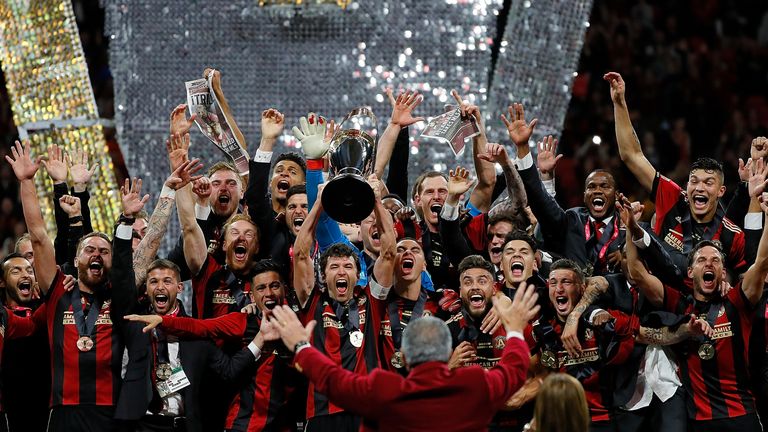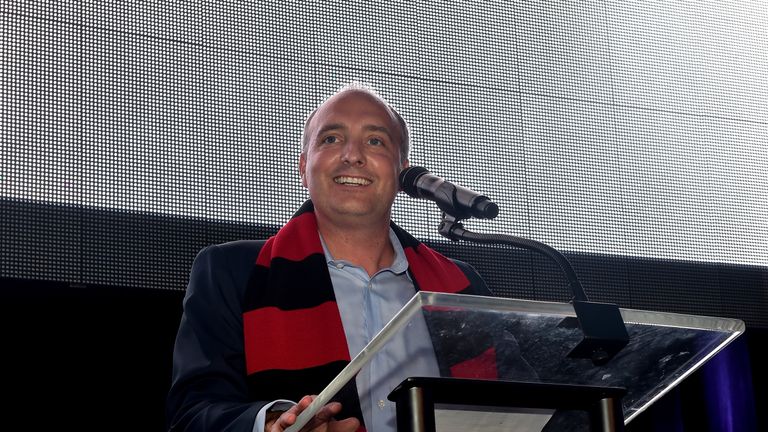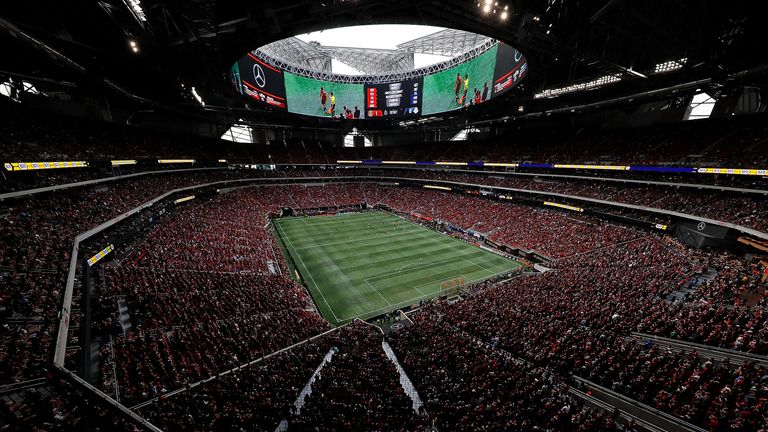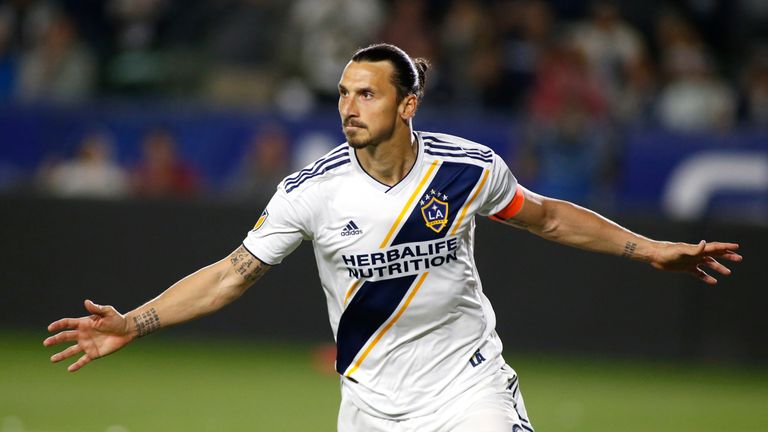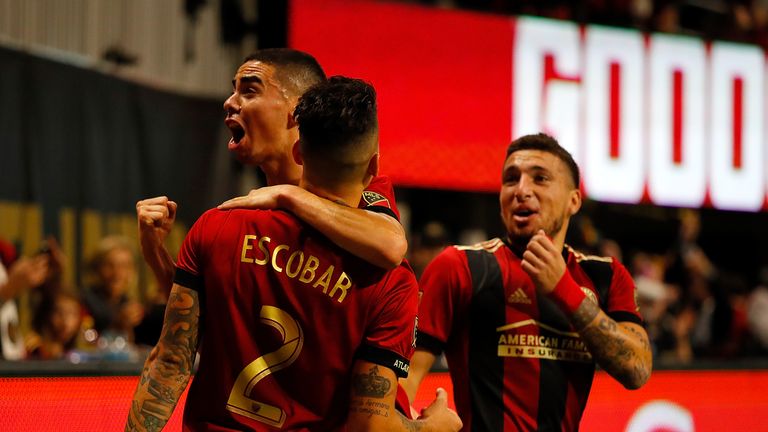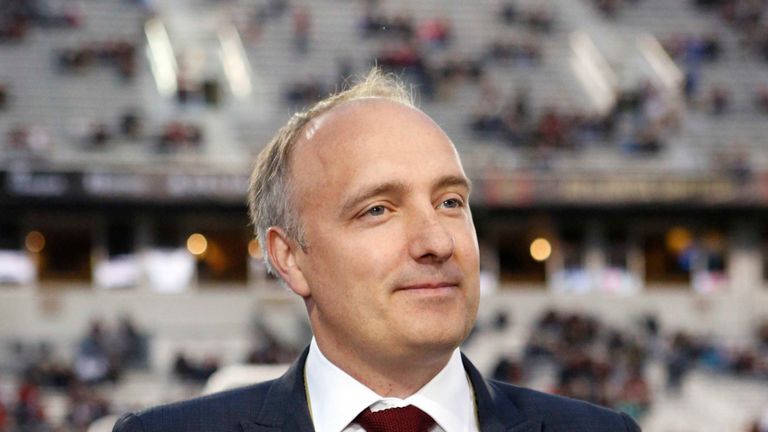How Atlanta United conquered MLS and now plan to build a dynasty
How Atlanta United becoming one of the world's best-supported clubs and what English football can learn from it all. Club president Darren Eales speaks to Adam Bate ahead of the MLS playoffs...
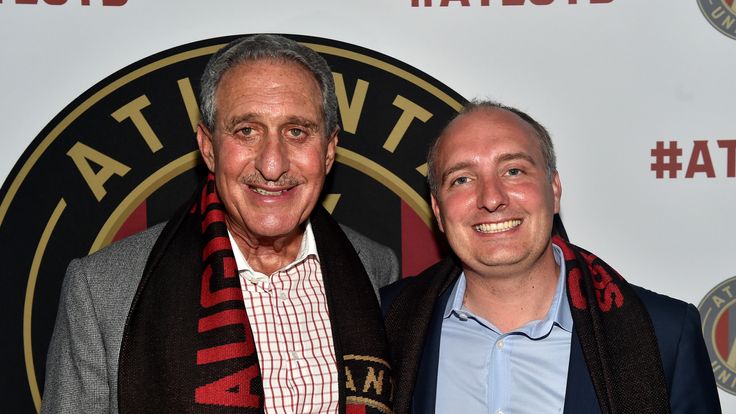
Thursday 17 October 2019 12:38, UK
The structure of Major League Soccer with its salary caps and draft system is supposed to mitigate against dynasties but that's exactly what one club is planning as the 2019 playoffs kick off this weekend. It is not Los Angeles Galaxy or New York Red Bulls best placed to make that happen. It is a team that had not even kicked a ball just three years ago.
Not everyone expected Atlanta United to succeed. At first, their extraordinary attendances were dismissed as a fad. But the numbers have actually increased and results have followed too. They won the MLS Cup in 2018, in only their second season, and followed it up by becoming the first US outfit to defeat their Mexican counterparts in the Campeones Cup.
Atlanta United are now among the top 10 supported clubs on the planet based on their home attendances and are rated as the most valuable franchise in Major League Soccer. President Darren Eales, a former British footballer turned administrator, has just picked up an award as the best executive in the game at the World Football Summit in Madrid.
So how exactly has all this been achieved?
Here, Eales explains how Atlanta United have broken the mould.
Long-term planning
Atlanta United had financial backing thanks to Arthur Blank, the man who started the popular retail chain Home Depot and the owner of the NFL franchise, the Atlanta Falcons. But it required much more than money to bring success. It required long-term planning - starting with the appointment of Eales as president as long ago as 2014.
"He hired me two-and-a-half years before we kicked a ball," Eales tells Sky Sports. "That was a pretty unusual decision because usually the way that teams would approach it is that they would hire you only when the revenue starts coming in and when you start playing matches. They would wait until the last minute to hire. Instead, I had two-and-a-half years unbeaten.
"It was important because you don't get a second chance to make a first impression and this gave us the runway to succeed. It was a unique situation as well because it was a totally new club. It was not like Orlando City that had been in the lower league already. We were brand new so as well as putting a team together, there was the kit and the whole identity."
Tapping into NFL expertise
Blank's ownership of the Falcons proved a significant advantage for United because it allowed them to share ideas and knowledge with a franchise that had vast experience in the US sports market. It also meant that the owner himself was already aware of some of the factors in a team's success that could have been overlooked by someone less savvy.
"Our owner understood the importance of a training ground because of the Falcons," says Eales. "So we built one that is one of the best in North America. It was an easy sell to him because he realised that this sets your identity when you try to recruit players. Having the Falcons as an example was a real blessing for us in terms of that infrastructure.
"It also helped me with the draft which was all new to me. Although it's a different sport, Dan Quinn and Thomas Dimitroff, the head coach and general manager of the Falcons, let me sit in on a couple of their drafts and it gave me that idea of how you approach it. How do you prepare? What do you do when your pick gets taken by the team before you?
"Being able to analyse little things like that well in advance really set us up for success. When I look at our first MLS draft, we had a second pick and an eighth pick. We went with Miles Robinson, a young centre-back who has just played for the national team, and Julian Gressel who has been one of our most important players for the last three years."
Avoiding the ageing stars
Players such as Robinson and Gressel have become popular figures at the club but that is typical of the recruitment policy that has been such a feature of Atlanta United's success. It would have been tempting for Eales to look to make a quick impression by bringing in a star name. Plenty were available. Instead, he went with a completely different strategy.
"Steven Gerrard, Frank Lampard and Bastian Schweinsteiger," says Eales. "They were the players others were signing. The theory was that it would attract attention but we knew that we already had this groundswell of support so our aim was just to put the most exciting team on the pitch that we could in the belief that fans would grow to love those players.
"The timing was right because the league had got better. Coupled with the fact that we had brought in Tata Martino, the former Barcelona and Argentina coach, it meant that we could attract the talent. You could take younger talent and pitch it to them that they could come here and give us a good two or three years before moving on to one of the top leagues.
"It worked. I am so proud that we have created our own stars. By the end of last season, Miguel Almiron's was the top-selling shirt in MLS. That just shows that if you provide fans with exciting new talent they will grow to love them. Miguel then got his move to the Premier League so we proved the concept. We showed it doesn't have to be a retirement league."
Focusing on the fans
Almiron's popularity was a reflection of the fact that the club had targeted a particular type of supporter in the city. In a bid to construct something long-lasting, they did not go in search of the celebrity-hungry day-trippers who might go to a game out of curiosity. The strategy was to target those already enthusiastic about the game and get them engaged.
"It was a slightly different focus to others," Eales explains. "We made a conscious decision not to target those who might be interested in soccer. We went for the avid fans who already loved the game of soccer. We made them feel like they were part of a movement. We used the fact that we were starting from scratch to bring them along on the journey.
"Our joke is that we have pub-crawled our way to success. In those first two-and-a-half years when they were showing Premier League games in the mornings in Atlanta we would go out and support and engage with them wherever they were. We went to national team viewing parties. That sort of got us that momentum that has taken it to a whole new level.
"We averaged 48,000 fans in the first season and people said it was just because it was the shiny new object. Then the next year we got to 53,000. This season, we are at 55,000 and one survey now has us as the 10th biggest club in the world in terms of attendance. Our fans have become our ambassadors and we have been able to grow through them."
Can they build a dynasty?
The question of how much more than Atlanta United can grow is a tricky one. Sustaining success in Major League Soccer is a challenge because of the financial constraints that come with the salary cap. The sort of growth that a similarly successful team in European football might expect to now enjoy is instead curtailed. It is a source of frustration for Eales.
"The hardest thing to accept is that when you become champions in the Premier League you can give everyone a little rise as a well done," he explains. "After winning the MLS Cup, everyone feels like they deserve a pay increase but if you want to give someone a rise in MLS then you have to trade someone else because you only have a finite amount of money.
"That was an eye-opener for me because you are hoping you can bask in the glory of the success but instead we had to make some tough decisions because of the salary cap. We ended up trading our left-back just to create cap room. It is really tough because we want to compete against the teams from Mexico in the Champions League.
"We did manage to beat Club America in the Campeones Cup, which is the winner of Liga MX versus the winner of the MLS Cup, so we have shown that we can compete in a one-off game. But that was because we had everyone fit and we were in the middle of our season. We still need to work on how we can improve our strength in depth.
"For example, we had a situation where we were knocked out of the Champions League by Monterrey but they were bringing Rodolfo Pizarro off the bench, a $16m player. Meanwhile, our full-back might be earning $60,000 a year because we have a few injuries. So that's the tricky part, the squad depth. But we are making small steps. It's getting better."
Lessons for the English game
Eales was recruited, in part, because of the knowledge and expertise that he had acquired as company secretary at West Bromwich Albion and director of football operations at Tottenham. It might amuse both sets of supporters to know that Eales credits his time there as giving him "a good grounding" for getting used to working with a salary cap in MLS.
But given the remarkable success that he has enjoyed in constructing a team from scratch over in the States perhaps there are lessons that English football can learn from Atlanta United now too. From the reduced prices of the hot dogs to the increased fan engagement, it is tempting to think Premier League clubs could learn plenty from their US counterparts.
"It's not that you take fans for granted in the Premier League but there is not that same level of urgency because the TV money is so huge," adds Eales. "There are waiting lists for season tickets and most clubs have that affinity for the club passed through the generations - their father was a Spurs supporter so now they are a Spurs supporter.
"As a result, it is easy to become complacent and perhaps not every decision that a Premier League club makes is necessarily made with the supporters in mind. For us, I can honestly say that the first thing we think about is how our decisions will impact the supporters. We have to win hearts and minds so we cannot afford to take them for granted."
What's clear is that as Atlanta United prepare to begin their playoff campaign in front of another packed Georgia crowd against New England Revolution on Saturday, Eales is enjoying it more than ever. "It is a great city and it is a great league," he says. "I quite like the idea of being a pioneer here as we try to grow the sport. I am in no rush to return."


